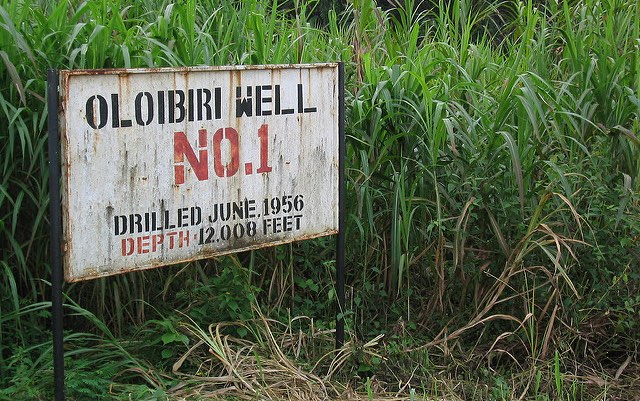The economy of Nigeria has had to navigate a major crisis that started with the collapse of oil prices in 2014 and was worsened by the ongoing restiveness in the oil rich Niger Delta region.
The crisis of the past four years reaffirms the vulnerability of the Nigerian economy to oil-related shocks. It underscores the need for Nigeria to look outward, diversifying its export base away from the volatile commodity if the country is to win its battles against poverty and inequality.
Oil accounts for 90 percent or more of Nigerian merchandise exports. The Nigerian economy’s heavy dependence on oil as the dominant source of foreign exchange is widely acknowledged. But the mechanisms through which oil price changes affect the economy and the measures (or lack of them) available to the Nigerian authorities to counter oil price declines are less commonly understood.
We traced the impact of the recent price declines and considered what policy options were available to the Nigerian authorities to come up with counter measures.
The vulnerability of the economy to oil price shocks has been known for years, and the case for diversification has been made many times. But, as our paper points out, development of a robust non-oil export base is, in all likelihood, no longer a policy choice, it is a growth imperative. To grow and develop over the long term, Nigeria needs very rapid growth in non-oil exports.
The good times (1998-2014)
From 1998 to 2014, an oil price boom unfolded that saw the price of Nigeria’s dominant export increase in nominal dollar terms by a factor of about ten: From about $10 per barrel to more than $100. While the boom period was characterized by some volatility, most notably in 2008, on average, the oil price rose persistently for more than 15 years.
In other words, in 1998, Nigeria got about $10 worth of imports for each barrel of oil exported. In 2014, Nigeria obtained about $100 worth of imports for each barrel of oil exported.
This strong upward trend in oil prices dulled incentives to diversify. Exports provide the foreign exchange for purchasing imports. Nigerians were able to significantly expand imports over time for the same volume of oil exports.
The adjustment period (2015-present)
By the end of 2015, oil prices had collapsed. At that time, Nigeria got only about $40 worth of imports for each barrel of oil exported. By Aug. 2018, prices had rebounded to about $65 per barrel or about $65 worth of imports for each barrel exported. This is still well below the levels of 2014.
Faced with persistently lower oil prices, Nigerian policymakers had, in principle, two options: Increase exports or reduce imports. In practice, because increasing exports is effectively impossible in the short term, there was only one viable option: Reduce import volumes to levels consistent with Nigeria’s reduced purchasing power.
This is exactly what happened. Between 2014 and 2016, import volumes declined by about 44 percent, an enormous reduction. Reduced imports meant fewer goods available in the economy, which in turn meant less consumption by households, less investment by business, and less government service.
This has been painful. We estimate that total real spending on consumption, investment, and government declined by about 12 percent per person between 2014 and 2016, a large macroeconomic shock.
Changing course
Looking forward, in the absence of a long term rebound in oil production or world oil prices, foreign exchange earnings from the sale of oil will remain relatively constant. In this (likely) situation, the economy must export more of something other than oil, in order to import more.
It’s hard to see how the Nigerian economy can grow consistently without more imports. Businesses in a growing economy require more capital goods and more intermediate inputs. Without progressively more exports, there cannot be progressively more imports of efficient machines, tools, and other technologies that are critical for growth.
The only way Nigeria can avoid this stagnant state of affairs is if it does something dramatic about increasing non-oil exports. Nigerian businesses need to develop products of export quality at globally competitive prices. They must also develop the networks to market those products abroad.
This is difficult, and it will take time. But there are some clear initial options.
Agricultural products are potentially a part of the solution. This is particularly true in the relatively near term as global agricultural markets are relatively easy to enter if quality and cost are competitive.
Another potential area for development is providing regional services—for example, developing Lagos as an airline hub and shipping center.
Given its large domestic market and its large labor force, Nigeria should also be looking at some longer term strategies to attract foreign direct investment into manufacturing sectors as the first step to learning to compete on global markets.
For more than a generation, Nigerian business, outside of oil, has focused almost exclusively on the domestic market. Looking forward, a significant segment of Nigerian business must look outward to the international market. Initiating, nurturing and growing this outward looking perspective is today’s key economic challenge for business, policymakers, and civil society.
Channing Arndt is Director of IFPRI’s Environment and Production Technology Division. Adedeji Adeniran is a Senior Research Fellow at the Center for the Studies of Economies of Africa in Nigeria, University of the Witwatersrand. Chuku Chuku is a Lecturer at the Department of Economics at the University of Uyo. George Mavrotas is an IFPRI Senior Research Fellow and Head of the Nigeria Strategy Support Program. Morakinyo Adetutu is a Lecturer in Economics at Nottingham Trent University. Victor Ajayi is a Research Associate at the University of Cambridge. This post first appeared on The Conversation.







